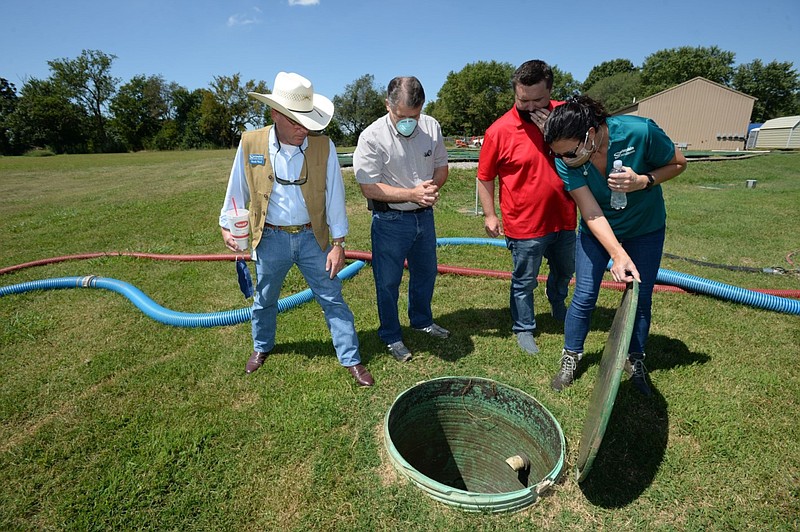SPRINGDALE -- The city of Springdale now has the plans and soon will get the money to clean up two decommissioned wastewater treatment plants in the former city of Bethel Heights.
The City Council on Tuesday night unanimously approved the sale of $3 million in bonds backed by loans from the Arkansas Natural Resources Commission for the cleanup. Any remaining money will be used to extend a main sanitary sewer line farther into the area of the former town.
The Resources Commission will vote on the loan in September.
Bethel Heights was annexed into Springdale in August 2020 after residents of both towns voted 64% in favor of it. At issue was the Bethel Heights wastewater treatment system, which for at least 10 years the city had operated out of compliance with its license from the Arkansas Division of Environmental Quality.
The Bethel Heights officials continued to run the plant after orders from the state to fix the system and roughly $100,000 in fines. Wastewater would pool at the surface of the city's two wastewater treatment plants and in the yards of those living next to the treatment plant on Lincoln Drive.
The $3 million will come to Springdale in the form of two loans: a $1 million loan that won't have to be repaid and a $2 million loan with 1% interest over 10 years, Shep Russell explained to council members. Russell is a bond attorney with Friday, Eldredge and Clark law firm in Little Rock.
The closure plan Springdale Water Utilities presented to the Arkansas Division of Environmental Quality in January 2021 estimated a cost of $215,000 to remove infrastructure at the Lincoln Drive plant and $195,000 for the North Oak Street plant, said Rick Pulvirenti, chief engineer and operating officer for the Springdale utility. More recent estimates place the cost for cleanup at $1 million and construction of the new sewer main at $2 million, he reported. But those prices probably have changed, he said.
The utility will put the project out for bids in about a month and then will have a more accurate cost estimate, he said.
The cleanup of the plants and installation of a sewer main to connect residents to the Springdale sewer system will take about a year, Pulvirenti said.
But the utility can't start construction until November, Pulvirenti said. The U.S. Fish and Wildlife Service won't allow removal of trees in the area from April to November. Endangered Ozark big-eared bats use the region's trees for nesting and raising their young. The project will include removal of a few trees, Pulvirenti said.
Springdale has lifted a moratorium on water and sewer service to new construction in Bethel Heights the utility imposed at the state's request.
Tina Bowen, who lives just north of the Lincoln Drive site, said Tuesday that Springdale has done what it promised.
"They have been doing good taking care of the property," she said.
Bowen's yard often flooded with sewage before the town was annexed, but flooding in this spring's rain has been very mild, she said. And she can open her windows to enjoy the good weather.
Bethel Heights operated a septic tank effluent pumping system to treat its wastewater. Each customer has a small septic tank to hold sewage and pump it to one of the plants. The Bethel Heights plant would partially treat the water, then release it to an irrigation system. These systems were supposed to slowly release the water into the ground, letting the natural features of the ground continue the treatment.
Immediately after the annexation, Springdale Water Utilities immediately took over operation of the Bethel Heights treatment plants and had the pooling stopped in three weeks.
The utility pumped and trucked millions of gallons of untreated sewage to the Springdale Wastewater Treatment Plant while it built temporary pipelines to divert all wastewater from Bethel Heights customers to the Springdale plant.
The Springdale utility at that time spent $120,000 to reroute the sewage and close the treatment plants in 30 days.
Parts of the pipeline run above ground and will be buried, said Heath Ward, executive director of the water utility.
The utility had provided Bethel Heights with drinking water for many years.
The utility's plan approved by the Arkansas Division of Environmental Quality will see most infrastructure of the treatment plants dismantled and sent to the landfill and the sites regraded and seeded for grass.
Some tanks will remain because removal would be too difficult, Pulvirenti said. They will be cleaned, punctured in the bottoms to prevent backup of drainage and filled with rock.
He said the 1-inch tubing lines related to the dispersal of the system also will stay in place.
Any sewage remaining in the lines and equipment, "Mother Nature will take care of it," Ward said.
The contractor for the project and the utility will keep detailed records and photographs for the state division, the plan reads.
The plan also includes burying those temporary pipes running north from the treatment plant on Lincoln Drive. The line will connect to a main sewer line running from southern Lowell, where Springdale utility provides half of the water and sewer service.
The utility will use money remaining after cleanup to improve the Springdale sewer infrastructure and increase sewer capacity to the area, Ward said.
Lowell recently asked to purchase extra capacity in the Springdale wastewater treatment system for $1.9 million to keep up with growth.

